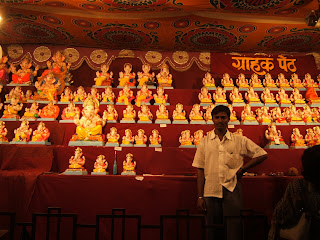Ganpati requires that every family buys a small Ganesh statue on the first day, keeps the statue in their house for ten days, and then puts the statue into the river as part of a big procession in the centre of Pune that goes on non-stop for 30 hours. The statues are made of soil and so disintegrate and get washed away. A new statue must be bought for each Ganpati festival. There is a small village on the Bombay-Pune road which is making a killing out of this, as the soil for the statues comes from there and the villagers are responsible for making the statues that are sold in Pune. Demand is so high that they spend the whole year making the statues, with a ceremony some time after each Ganpati marking the beginning of production for next year's festival. Or so I was told by a kind old kaka (uncle) who gave me a piece of apple while I took the photo below of a stall outside a department store on Tilak Road, which was doing good business at 11pm on the night before Ganpati.

That night I wandered the streets and my cynicism kept me company. For the past couple of weeks teams of men have been digging holes at the sides of the roads, sticking poles in them, and building structures along the sides and over the roads. Aha, I thought, these are for traditional decorations. That night, the night before the beginning of the 10 days of Ganpati, I observed that the structures had been covered with posters that admittedly had Ganpati themes, but were mainly advertising various luxury products. I recalled the comments of a jaded friend that Ganpati is no longer what it once was; it is no longer a festival of the community but of the corporation, one in which more money floats each year and what was once done within the community for Rs100 is now done for Rs10000 by the local department store. Or by the local politician, sometimes using money from the public services budget.
But there's more to it than that. For a start, Ganpati is not some quaint and innocent tradition of throwing a statue in the river that has only recently been distorted by business and political interests. From conversations with various Punyachas I have gleaned the following account of Ganpati's history. Long ago Ganpati was a festival conducted in private within the home, comprising offerings to placate elephant-headed Ganesh. Ganesh was a fat and lecherous god who represented the tribal 'Other' within the Hindu pantheon, demonstrating, through his debauchery (apparently he normally had "at least two wives"), the lack of civilisation among the tribal communities that existed outside caste society, and thus the necessity of the caste system. One of the stories explaining the origins of Ganesh involved Parvati, the second consort of the god Shiva, bathing in a river after a long time without washing and moulding a figure out of all the dirt she washed off herself; this became Ganesh when she breathed life into it. During the struggle against the colonial power, the nationalist Tilak (known to the British as "Father of the Indian unrest") completely changed the nature of the festival into a noisy community celebration of Ganesh as a 'good' God, in order to exploit a loophole in British laws that prohibited public gatherings. And then in more recent years, the emerging Maratha nation has emphasised the Maharashtran roots of Tilak's Ganpati (Tilak was a Punyacha) to assert their identity as something distinct from all the non-Maharashtrans migrating into the state.
As if that wasn't complicated enough, the very same progressives who gave me this account of Ganpati went on to surprise me when the processions returned to the street where we were. I made a face. "It's so loud," I said. One of the men grinned. "I know. And I love it." And as the fire crackers exploded in the street outside for the umpteenth time and the young men danced round, I figured that as I have no choice in the matter I might as well try to enjoy life at too many decibels.
As if that wasn't complicated enough, the very same progressives who gave me this account of Ganpati went on to surprise me when the processions returned to the street where we were. I made a face. "It's so loud," I said. One of the men grinned. "I know. And I love it." And as the fire crackers exploded in the street outside for the umpteenth time and the young men danced round, I figured that as I have no choice in the matter I might as well try to enjoy life at too many decibels.
